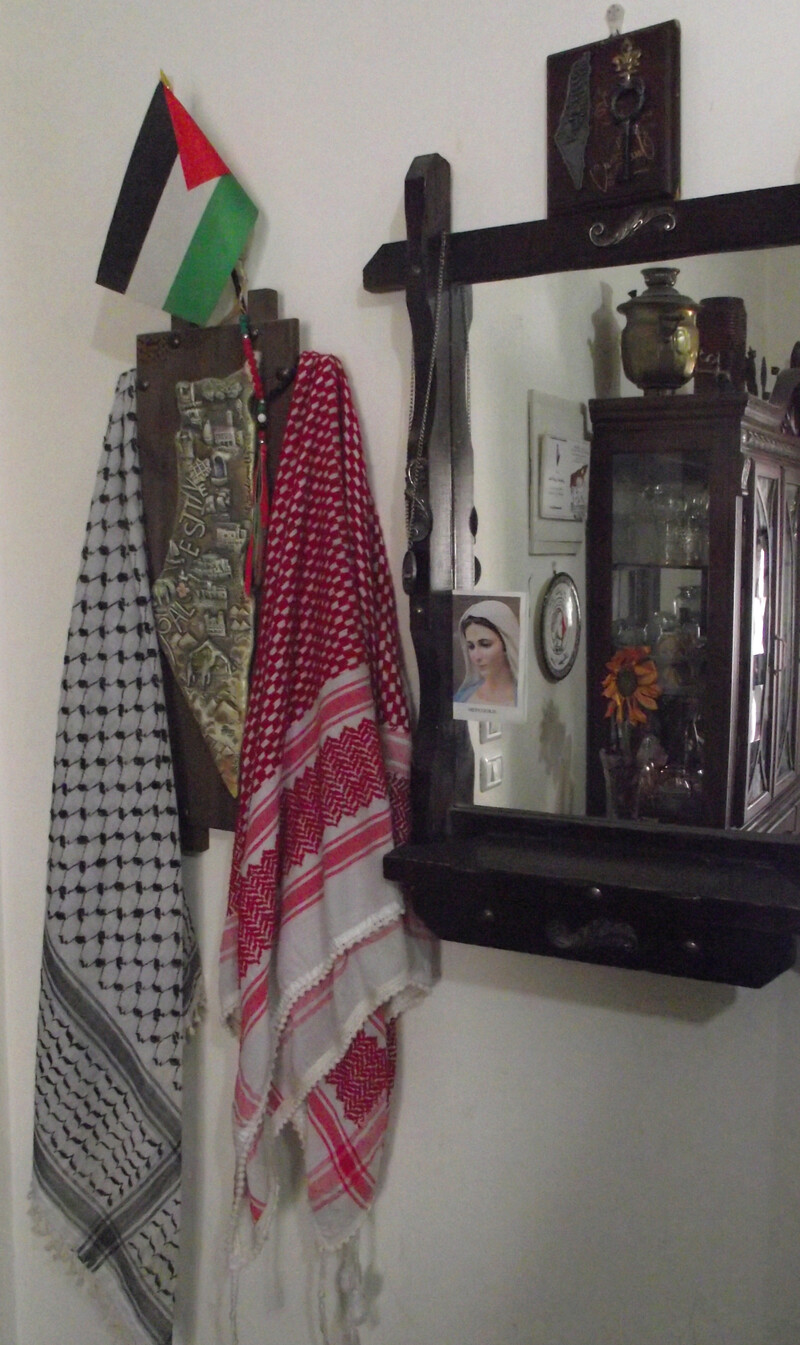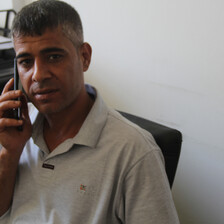The Electronic Intifada Kufr Aqab 6 May 2012

Samir and Samira Halabi
The Electronic IntifadaLate one night in March, Rami Halabi was working on a laptop at his family’s apartment home in Kufr Aqab, on the road between Ramallah and Jerusalem in the occupied West Bank. Suddenly, a group of Israeli soldiers banged on the door and demanded to be let in. They confiscated the iPhone his employer had lent him, and, despite the pleas of his mother, father and sister, they took Rami away to prison.
This is a scene all too familiar for many Palestinian families living under the boot of Israeli occupation. But there is one difference for the Halabi family that night: all three of Rami’s brothers were already imprisoned by Israel.
In a translated interview with The Electronic Intifada, their mother Samira recounted her plea to the soldiers not to part her from her last free son: “I went to hug my son, and I said, no, you’re not taking this one, you have three already, leave this one!”
One of the soldiers took Samira and her husband Samir aside. “They took us to the room to preach at us,” Samira said. “While we were in the room, they took Rami. And his dad was next to him, and they didn’t let him say goodbye to his son … they were really obnoxious.”
As the soldiers once again searched the home, Samira reached the end of her tether: “It’s still untidy [from last time],” she told them. “It’s my fault, I didn’t bring media to come and cover it and take photos.”
Accused of solidarity activism
Rami has been held in Ofer prison on remand since then. A spokesperson for the Palestinian prisoner rights organization Addameer said the Israeli authorities are accusing him of involvement in Kutub Talabi, an activist group at Birzeit University which the Israelis say is close to the Popular Front for the Liberation of Palestine (PFLP), the secular, Marxist-Leninist political party.
The night they took him, according to the account of workers at a nearby restaurant, “there was a collaborator standing on the top of the hill,” said Samira. “They saw him wearing a mask.” Disguised Palestinian collaborators helped Israeli soldiers during each arrest, she added.
The previous arrest had come only a week before, on 12 March, when Rami’s brother Nasser was taken. His brothers are all accused of being activists in Kutub Talabi, which is involved in organizing solidarity with Palestinian prisoners.
A student at Al-Quds Open University, Rami was also working for an alcohol company when he was arrested. His mother says he was no longer politically active.
“I didn’t expect them to arrest him, because there is nothing about him [they could charge him with],” Samria said. All three served previous prison terms in 2004 and 2009, but this was Rami’s first arrest. Rami has yet to be charged.
Samira says the Israeli soldiers caused a lot of damage when they arrested Nasser, the youngest son, at 21. “They removed the wardrobe. They searched the drawers. They threw the clothes on the floor. They checked the jackets. They opened every zipper on the jackets. They broke all the kids’ beds. When I put myself back together, I’m going to bring the carpenter to [fix] them.” The soldiers also stole a laptop and several mobile phones.
“It was horrific,” Samira said, recounting how the armed soldiers threatened the family. “I started to talk a lot. I said, I want to see my son, why are you taking him? What do you want from him? And so on. They said, shut up, shut up, we’ll destroy the house. But I didn’t shut up.”
As they were taking Nasser away, he tried to reassure his mother. “He said, ‘don’t be scared.’ I said, ‘no you are heroes, why should I be scared? I raised you this way,’” Samira recollected.
Samira began to weep during the interview, the forced parting from Nasser still raw. Nasser is currently being held on remand in Eshel prison, in Beir al-Sabe (Beer Sheva) in the Naqab (Negev) desert. In 2009 he spent a year in prison.
“You don’t know how to raise your kids”

Samira says her sons have been imprisoned because they are accused of activism: helping organize solidarity with the prisoners, throwing stones during demonstrations and membership of a banned organization, the PFLP. “I don’t want to say, but they [the Israelis] considered them big organizers.”
On 5 April 2011, when they came for Nael, one of the soldiers displayed a sense of sarcasm.
They hammered on the door so hard they seemed ready to break it down, until husband Samir rushed to open it. They went in to arrest Nael, and one soldier gestured as if to shake his hand. Nael did not reciprocate. “There were [student] elections at [Birzeit] university. And you know that the Popular Front won ten seats, to the soldier said, congratulations, the Popular Front won ten seats. So my son ignored him.”
The soldier then told Nael to get dressed and come with him. Nael deliberately moved slowly, said Samira, washing his face, combing his hair. “He took his time,” she said. It was 2:45am.
Orders came over the radio to hurry up because there were confrontations between the soldiers and local youth outside.
“One of the soldiers said [to another soldier], ‘you can’t get him?’ And he started to scream,” remembered Samira. Again, they lectured the parents, demanding to know why they didn’t raise their son “properly.”
“I raised them well, I raised them this way to be patriotic,” the mother countered. “He didn’t like what I said to him.”
“I shook [Nael’s] hand, and I hugged him. I said, may the Virgin go with you, may Jesus go with you. I hugged him: what more can I say to him?”
And then they took him away into the night. He was sentenced to 14 months for membership in Kutub Talabi, and is due to be released from Ashkelon prison on 5 June. In November 2004, Nael spent four years and two months in jail, accused by Israel of membership of a banned organization.
Threats of re-arrest because of hunger strike protest
During more recent arrests, Samira says soldiers threatened to re-arrest Nael after his release, because he is a “trouble maker” who is currently on hunger strike along with approximately 2,000 other Palestinian prisoners. “They want him to be polite,” said Samira.
Raed, the oldest son at 28, was arrested on 25 May 2011 while he was crossing Qalandia checkpoint between Ramallah and Jerusalem. Samria says it was because he defied Israel, and, after serving previous jail time, went back to activism: “It’s because of the organization [allegedly the PFLP] and Kutub Talabi, papers, transferring [information] and so on.”
In 2004 he was sentenced to two years. During that initial arrest they also took his father along as a form of extra pressure on him to cooperate, Samir explained. A softly-spoken man whose multiple health problems have forced him into retirement, Samir, also known as Abu Raed, recalled how the Israeli authorities reprimanded him, saying: “You don’t know how to raise your kids.”
Nael was also on solidarity hunger strike when Khader Adnan and Hana al-Shalabi were on hunger strike, says Samira.
He has now been on hunger strike since 17 April — Palestinian Prisoners’ Day — the beginning of the growing mass hunger strike. Since Nasser and Rami are still under investigation, the leadership of the prisoners’ movement instructed them not to go on hunger strike for now.
Part of an attempt to break the prisoners’ movement
Aiming to win improved prison conditions, Addameer estimated this past week that 2,000-2,500 of Israel’s 4,600 Palestinian political prisoners are currently on hunger strike.
Mourad Jadallah from Addameer told The Electronic Intifada that the arrest of the Halabis was part of an Israeli attempt to break the prisoners’ movement.
“They don’t want to allow a solidarity movement,” he said. “Actions like these arrests make the price high for activists.”
Jadallah added that while the case of the Halabi family was unusual, it was not unique, and cited the case of the Abu Hammed family from al-Amari refugee camp in Ramallah who had four sons in jail with a fifth killed by Israel.
“You think about them all the time”
“Our problem is a real problem. We don’t know what to do or where to go,” said Samira Halabi. Asked if they are a political family, Samira says no, but that they are very proud of their sons
“This is their will and their love for their country. This is something that honors me and raises my head up,” she said.
How has the loss of four sons affected this family? “Depression. You think about them all the time,” said Samira, wiping away more tears.
Asa Winstanley is a journalist from London currently reporting from Palestine.





